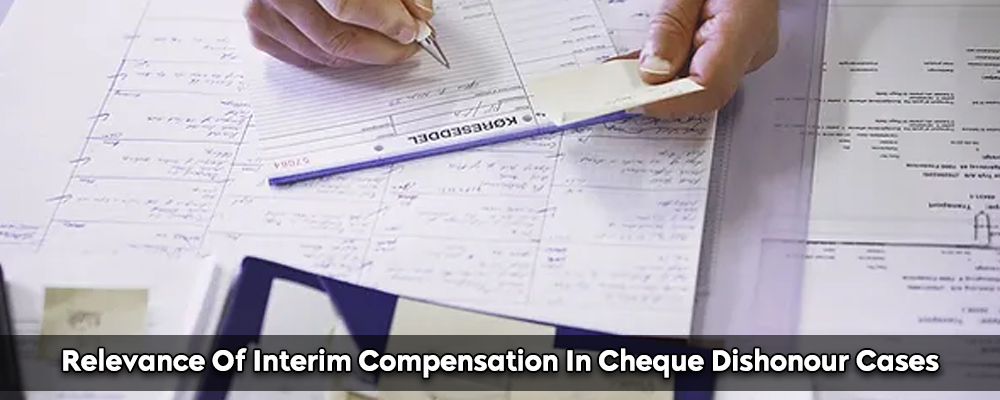The Negotiable Instruments (NI) Act of 1881 plays a crucial role in regulating the use of negotiable instruments like cheques in commercial transactions. It ensures the smooth functioning of business transactions by providing legal remedies in case of dishonour of cheques. In recent years, the issue of cheque bounce has become a major concern for businesses and individuals alike. It leads to financial losses, causes inconvenience, and affects the credibility of both the issuer and the recipient of the cheque.
To address these concerns, Section 138 of the NI Act was introduced, which made the dishonour of a cheque for insufficient funds or any other reason punishable with imprisonment or a fine. Additionally, Section 143A was added to the NI Act in 2018, giving the court the authority to direct the bearer of the dishonoured cheque to compensate the complaint in the interim while the case is pending.
Need A Legal Advice
The internet is not a lawyer and neither are you. Talk to a real lawyer about your legal issue

Section 143A: Negotiable Instruments Act
- It provides for interim compensation in cheque dishonour cases.
- It gives the court the authority to order the holder of the bounced cheque to pay the complainant interim damages while the case is being heard.
- The provision aims to address the financial hardships faced by the complainant during the legal proceedings.
- The court has discretion in awarding interim compensation based on factors such as the credibility of the complaint and the accused’s financial capacity.
- The accused must plead not guilty to avail them of the benefit of Section 143A.
- Proper safeguards are necessary to prevent misuse and protect the rights of the accused.
Role of Judiciary: Supreme Court
- In the case of Pawan Bhasin v State of UP, the Supreme Court clarified the circumstances under which the court can order the payment of interim compensation to the complainant in a cheque dishonour case. The bench, comprising eminent judges, considered the delicate balance between the rights of the complainant seeking redress and the fundamental principle of “innocent until proven guilty” for the accused.
- The court ruled that the accused can be directed to pay interim compensation only after they plead not guilty during the trial.
Relevance of Interim Compensation in Cheque Dishonour Cases
The Supreme Court’s ruling brings clarity and certainty to the issue of interim compensation in cheque dishonour cases. Some of the key relevance of this judgment is as follows-
Curbing frivolous complaints
The ruling acts as a deterrent against false or baseless accusations made under Section 138 of the NI Act. Ordering interim compensation only after the accused pleads not guilty discourages complainants from misusing the provision to harass the accused.
Upholding the presumption of innocence
The “innocent until proven guilty” principle is a fundamental tenet of criminal jurisprudence. By linking the payment of interim compensation to the plea of not guilty, the court ensures that the accused’s rights are protected until proven guilty in a court of law.
Balancing interests of both parties
Cheque dishonour cases can cause financial hardships to the complainant. The provision for interim compensation strikes a balance between the interests of the complainant, who may suffer due to the dishonoured cheque, and the accused, who may be genuinely disputing the transaction.
Encouraging resolution outside court
The ruling may encourage parties involved in cheque dishonour cases to explore alternative dispute resolution mechanisms, such as mediation, to resolve their differences amicably before formal trial proceedings.
Streamlining judicial process
The ruling may lead to a more efficient and expedited trial process as accused individuals may be more inclined to plead not guilty promptly, allowing the court to proceed with the matter accordingly.
The Supreme Court’s judgment on the payment of interim compensation in cheque dishonour cases provides much-needed clarity and strikes a fine balance between the interests of the complainant and the rights of the accused. The ruling is likely to have a positive impact on the legal landscape, curbing frivolous complaints, encouraging alternative dispute resolution methods, and ensuring an efficient judicial process. However, as with any legal decision, its success will ultimately depend on its implementation and interpretation in various lower courts across the country.
Overall, the judgment reinforces the importance of a fair and equitable legal system that protects the interests of all parties involved in cheque dishonour cases and strengthens the trust in commercial transactions within India’s business ecosystem.
One can talk to a lawyer at Lead India for any kind of legal advice. In India, free legal advice online is available by Lead India. Along with getting free legal advice online, you can ask questions to experts online free at Lead India.





 Talk to a Lawyer
Talk to a Lawyer